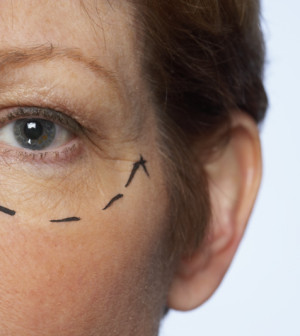- 7 Best Breads for Maintaining Stable Blood Sugar
- Gelatin vs. Collagen: Which is Best for Skin, Nails, and Joints?
- The Long-Term Effects of Daily Turmeric Supplements on Liver Health
- Could Your Grocery Store Meat Be Causing Recurring UTIs?
- Are You Making This Expensive Thermostat Error This Winter?
- Recognizing the Signs of Hypothyroidism
- 10 Strategies to Overcome Insomnia
- Could Artificial Sweeteners Be Aging the Brain Faster?
- Techniques for Soothing Your Nervous System
- Does the Water in Your House Smell Funny? Here’s Why
Botox Approved as Temporary Treatment for Crow’s Feet


THURSDAY, Sept. 12U.S. Food and Drug Administration approval for Cosmetic Botox (onabotulinumtoxinA) has been expanded to include moderate-to-severe lateral canthal lines, the medical term for so-called “crow’s feet” lines that surround the eyes.
The drug was approved in 2002 for the temporary improvement of so-called “frown lines” between the eyebrows, the agency said in news release. The drug, made from the bacterium that causes botulism, keeps affected muscles from tightening, reducing the appearance of wrinkle lines.
The injected drug may now be given at the same time to reduce both crow’s feet and frown lines, the FDA said.
The drug’s safety and effectiveness in treating crow’s feet were established in clinical studies involving 833 adults, who were either given Cosmetic Botox or a non-medicinal placebo. Those given Cosmetic Botox showed a greater improvement in crow’s feet lines, the agency said.
The most common side effect of the drug when used for this purpose was swelling (edema) of the eyelids, the FDA said.
The non-cosmetic version of Botox has been approved to treat conditions including chronic migraine, severe underarm sweating, eyelid spasm and a certain misalignment of the eyes. The drug, in both its cosmetic and non-cosmetic forms, contains a boxed label warning of the possibility of botulism-like symptoms. These include swallowing and breathing difficulty, which could be life-threatening, the FDA said.
However, the agency said there has been no confirmed case of “toxin spread” as long as either form of Botox were used at the recommended dosages for FDA-approved reasons.
Botox is manufactured by Allergan, based in Irvine, Calif.
More information
The FDA has more about this approval.
Source: HealthDay
Copyright © 2026 HealthDay. All rights reserved.










